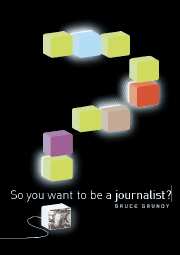Book contents
9 - Australian law
Published online by Cambridge University Press: 05 June 2012
Summary
Ignorance of the law does not excuse a person from criminal responsibility for an act that would otherwise be an offence …
These are the words of Queensland's Criminal Code, s 48 (1). But words to similar effect operate or prevail in all jurisdictions. Ignorance of the law is no excuse.
If it were an excuse, everyone could claim they didn't know what they did was wrong and there would be no need for courts. It would probably be a pretty wild, even dangerous place out there. Relying on what others say the law is, even those who should know, is no defence either. The matter of ignorance of the law being no excuse was most recently settled by the High Court (Ostrowski v Palmer (2004) HCA 30).
What this case illustrates for the journalist, as well as for people like Mr Palmer, and everyone else, is simple. You have to know the law. And there is a great deal to know.
Laws that affect you as a reporter include: common law contempt, statutory contempt, defamation, and the laws that relate to children, divorce, family matters, domestic violence, sexual assault, bail, sentencing, prisoners, rehabilitation of offenders, privacy, confidentiality, copyright, and Freedom of Information, just to mention a few. The law in each state and territory is likely to be different, and then there are some matters that are federal issues (the responsibility of the Commonwealth) and some that are state issues.
- Type
- Chapter
- Information
- So You Want To Be A Journalist? , pp. 217 - 232Publisher: Cambridge University PressPrint publication year: 2007



